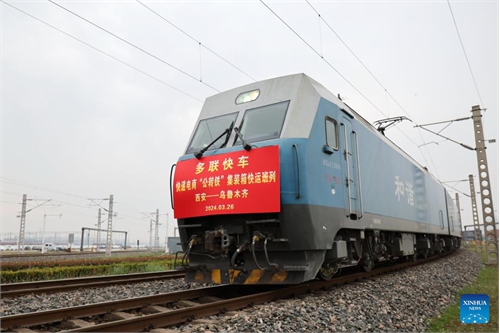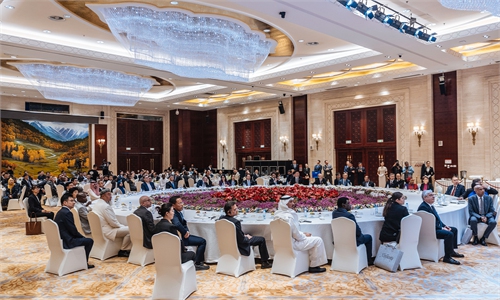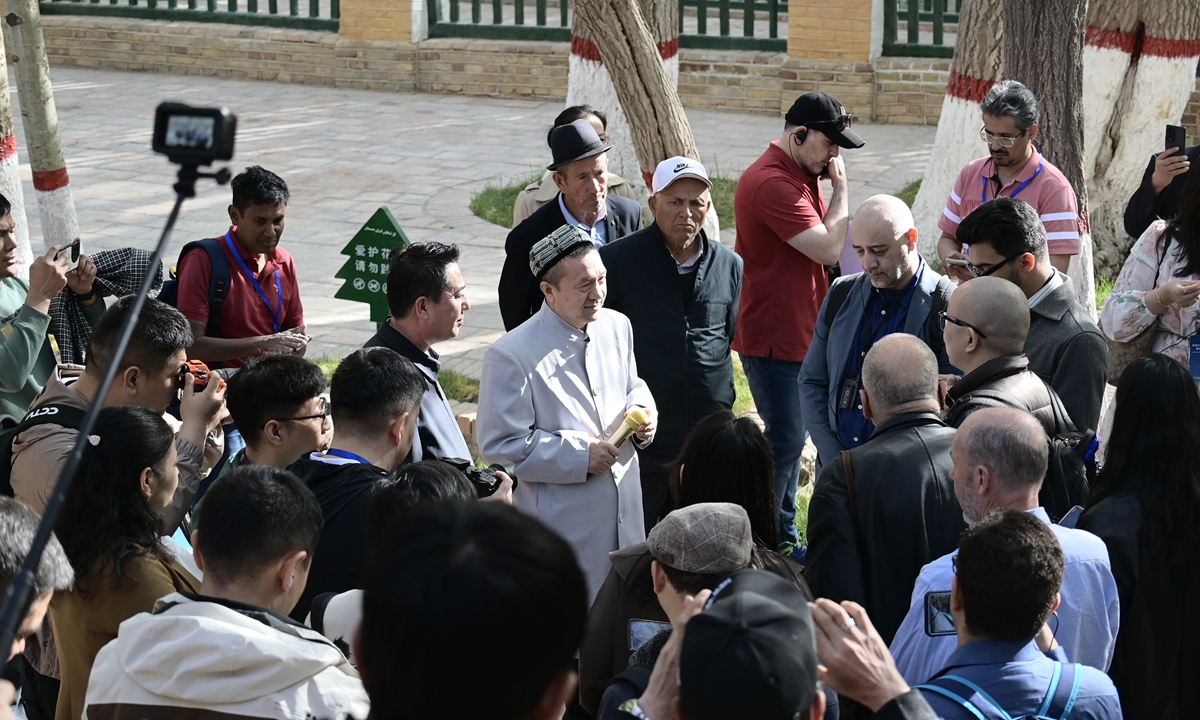
Foreign journalists talk with an Imam from Id Kah Mosque on April 10, 2024, in Kashi City. Photo: Tao Mingyang/GT
A media delegation consisting of 28 foreign journalists from 21 countries on Monday completed their week-long journey from April 9 to 15 in Northwest China's Xinjiang Uygur Autonomous Region, attending "Seminar for Media Directors of the Silk Road Economic Belt Partner Countries."
The journalists got to know Xinjiang's latest economic achievements, religious freedom and ethnic integration, after visiting local industry, farms, religious venues, kindergartens and residential homes in cities including Urumqi, Kashi, Korla and Yuli.
Nicholas Stuart, editor-in-chief from Australia-based ability.news, said he was impressed by Xinjiang's infrastructure build-up.
"I look at the roads that are being built, and a lot of things are very recent. It is certainly completed in the last 20 years, and there has been so much and obvious development in Xinjiang," Stuart said.
The delegation arrived at Kashi on the second day of the trip and their arrival coincides with the Eid al-Fitr, a two-day religious festival which marks the end of the Islamic holy month of Ramadan, with prayers, family reunions, treats, and other celebratory activities.
Muslim journalists from the delegation were invited to join the morning prayer in local mosques, followed by singing and dancing at the People's Square organized by local residents.
"On the morning of Eid al-Fitr festival, the trip organizers took us to morning prayers and I felt like I was at home," said Maryam Razzaq, a senior reporter from the Daily Scrum News of Canada, adding that as a Muslim, she felt very safe and welcome in Kashi City.
"What truly makes Xinjiang special is its people. I've never felt more welcomed anywhere else. The locals have embraced us with open arms, sharing their stories, their food, their culture and laughter," said Razzaq.
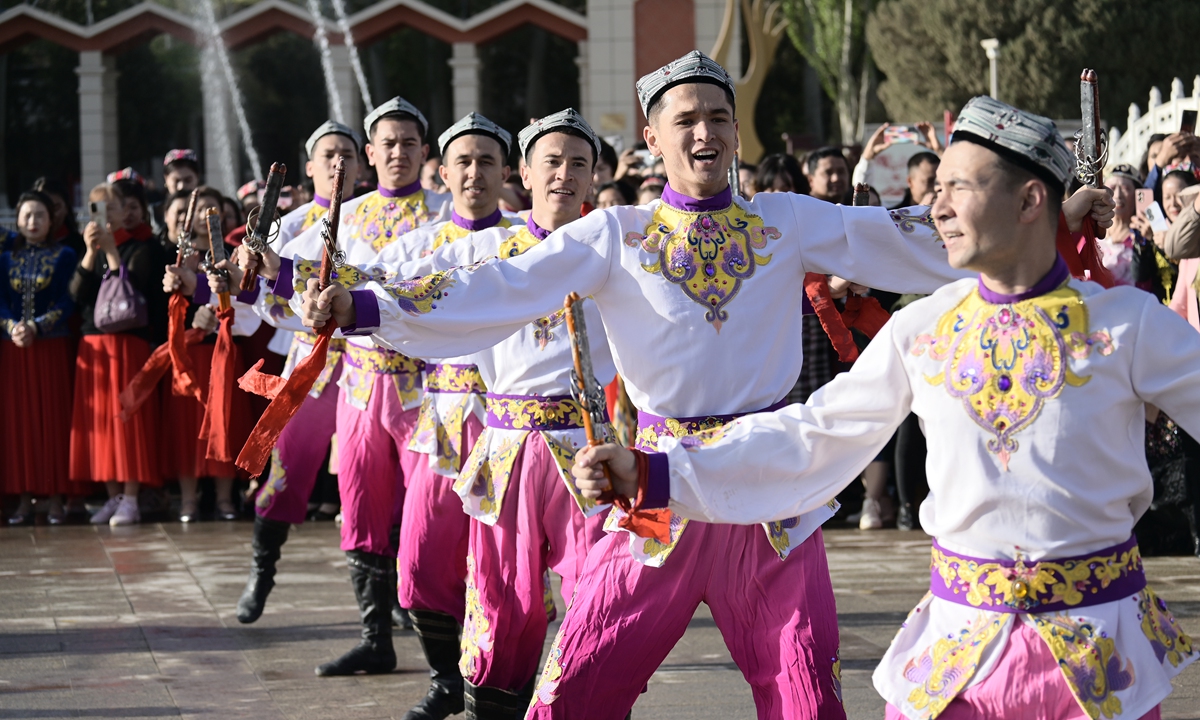
Local people celebrate the Eid al-Fitr on April 10, 2024, at the People's Square of Kashi City. Photo: Tao Mingyang/GT
Omar Ibrahim, a student and a blogger from Canada, told the Global Times that there was a perfect balance between preserving traditional identities and way of life, as well as local economic and technological modernization in Xinjiang.
"I see modern infrastructure, incredible buildings, beautifully decorated skyscrapers, and they coexist with people pursuing traditional ways of life such as local metal workers, street vendors and farmers, which I have never seen before in Canada where I live," he said.
The foreign journalists have developed a more comprehensive understanding of Xinjiang's role in the building of the Belt and Road Initiative (BRI) after touring the comprehensive bonded zone in Kashi City, and its specific facilities for cross-border e-commerce business and international mail exchanges.
Hussein Askary, vice chairman of the Belt and Road Institute in Sweden, said that Xinjiang is going to be very important in the BRI development, as it bridges goods from other parts of the EuroAsia continent
"Now I see there will be more industries in Xinjiang are dedicated for export, and will provide technology, goods, machines for countries in Central and West Asia, becoming a more important role which is not only a bridge," Askary said.
In contrast with the Western media's efforts to peddle disinformation, the foreign journalists have formed a comprehensive image of Xinjiang after experiencing and observing the region's rapid development combined with its diverse culture, vibrant economy, social stability and hardworking people.
After visiting local advanced agricultural facilities, an automatic cotton manufacturing plant and a solar energy farm in Korla City and Yuli County, Stuart was amazed by their production capacity, while dismissing the West' "forced labor" allegation. He said there wouldn't have and that there was no need for forced labor in Xinjiang factories.
As for some local jobs being replaced by advanced manufacturing machine, Askary pointed out that Xinjiang is not only home to primary industries such as cotton and textile but for making high-end products such as machineries and cars for export, and the demand for trained workers will uplift local employment.
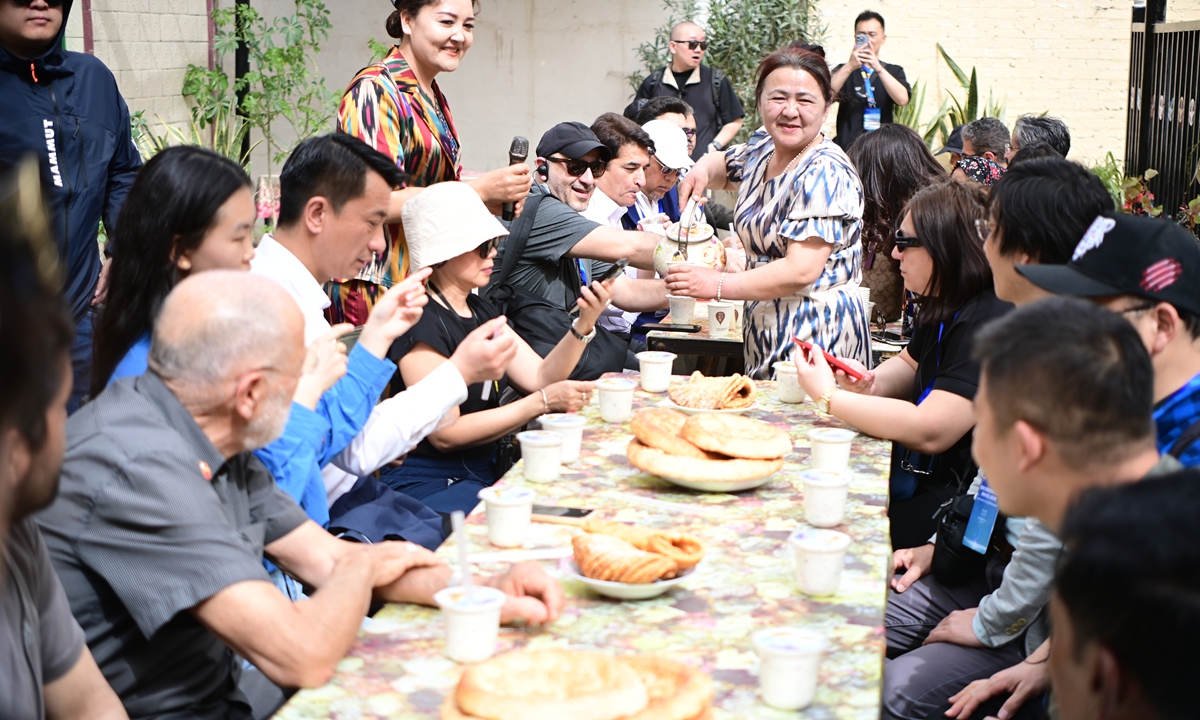
Foreign journalists visit local residents' home on April 13, 2024, at Yuli County. Photo: Tao Mingyang/GT
Beat Schneider, Professor Emeritus at the Bern University of the Arts in Switzerland, an expert on China studies and a writer, told the Global Times that he and his wife had an unforgettable visit in Xinjiang in October 2023, and this most recent visit impressed him a lot.
"I believe that the development of Xinjiang over the past 20 years has been very important to local social stability as well as multi-ethnic integration and unity, and the achievements made by the government are obvious. There has been success in the fight against terrorism, as well as very deep and rapid economic development," said Schneider.
Schneider discovered that Western media fabricated "ethnic oppression" in Xinjiang, which is a complete lie, after his visit to the Xinjiang Islam Institute in Urumqi and Id Kah Mosque in Kashi.
"It is a modern and advanced move to set an institute to train qualified imam for local religion development, and it can fulfill China's commitment of religion protection under the premise of law," said Schneider.
Global Times
